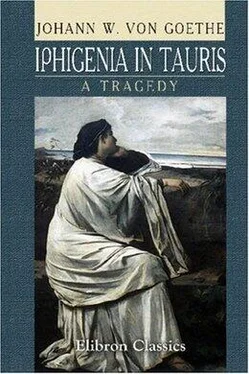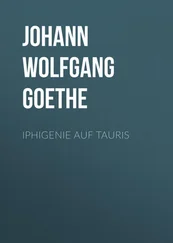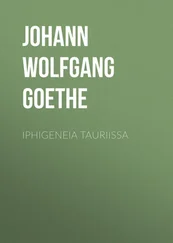SCENE II.
IPHIGENIA. PYLADES.
IPHIGENIA.
Whence art thou? Stranger, speak! To me thy bearing
Stamps thee of Grecian, not of Scythian race.
(
She unbinds his chains.
)
The freedom that I give is dangerous:
The gods avert the doom that threatens you!
PYLADES.
Delicious music! dearly welcome tones
Of our own language in a foreign land!
With joy my captive eye once more beholds
The azure mountains of my native coast.
Oh, let this joy that I too am a Greek
Convince thee, priestess! How I need thine aid,
A moment I forget, my spirit wrapt
In contemplation of so fair a vision.
If fate's dread mandate doth not seal thy lips.
From which of our illustrious races, say,
Dost thou thy godlike origin derive?
IPHIGENIA.
A priestess, by the Goddess' self ordain'd
And consecrated too, doth speak with thee.
Let that suffice: but tell me, who art thou,
And what unbless'd o'erruling destiny
Hath hither led thee with thy friend?
PYLADES.
The woe,
Whose hateful presence ever dogs our steps,
I can with ease relate. Oh, would that thou
Couldst with like ease, divine one, shed on us
One ray of cheering hope! We are from Crete,
Adrastus' sons, and I, the youngest born,
Named Cephalus; my eldest brother, he,
Laodamus. Between us two a youth
Of savage temper grew, who oft disturb'd
The joy and concord of our youthful sports.
Long as our father led his powers at Troy,
Passive our mother's mandate we obey'd;
But when, enrich'd with booty, he return'd,
And shortly after died, a contest fierce
For the succession and their father's wealth,
Parted the brothers. I the eldest joined;
He slew the second; and the Furies hence
For kindred murder dog his restless steps.
But to this savage shore the Delphian god
Hath sent us, cheer'd by hope, commanding us
Within his sister's temple to await
The blessed hand of aid. We have been ta'en,
Brought hither, and now stand for sacrifice.
My tale is told.
IPHIGENIA
Tell me, is Troy o'erthrown?
Assure me of its fall.
PYLADES.
It lies in ruins.
But oh, ensure deliverance to us!
Hasten, I pray, the promis'd aid of heav'n.
Pity my brother, say a kindly word;
But I implore thee, spare him when thou speakest.
Too easily his inner mind is torn
By joy, or grief, or cruel memory.
A feverish madness oft doth seize on him,
Yielding his spirit, beautiful and free,
A prey to furies.
IPHIGENIA.
Great as is thy woe,
Forget it, I conjure thee, for a while,
Till I am satisfied.
PYLADES.
The stately town,
Which ten long years withstood the Grecian host,
Now lies in ruins, ne'er to rise again;
Yet many a hero's grave will oft recall
Our sad remembrance to that barbarous shore;
There lies Achilles and his noble friend.
IPHIGENIA.
And are ye, godlike forms, reduc'd to dust!
PYLADES.
Nor Palamede, nor Ajax, ere again
The daylight of their native land behold.
IPHIGENIA.
He speaks not of my father, doth not name
Him with the fallen. He may yet survive!
I may behold him! still hope on, my heart!
PYLADES.
Yet happy are the thousands who receiv'd
Their bitter death–blow from a hostile hand!
For terror wild, and end most tragical,
Some hostile, angry, deity prepar'd,
Instead of triumph, for the home–returning.
Do human voices never reach this shore?
Far as their sound extends, they bear the fame
Of deeds unparallel'd. And is the woe
Which fills Mycene's halls with ceaseless sighs
To thee a secret still?—And know'st thou not
That Clytemnestra, with Ægisthus' aid,
Her royal consort artfully ensnar'd,
And murder'd on the day of his return?—
The monarch's house thou honourest! I perceive
Thy heaving bosom vainly doth contend
With tidings fraught with such unlook'd–for woe
Art thou the daughter of a friend? or born
Within the circuit of Mycene's walls?
Do not conceal it, nor avenge on me
That here the horrid crime I first announc'd.
IPHIGENIA.
Proceed, and tell me how the deed was done.
PYLADES.
The day of his return, as from the bath
Arose the monarch, tranquil and refresh'd.
His robe demanding from his consort's hand,
A tangl'd garment, complicate with folds.
She o'er his shoulders flung and noble head;
And when, as from a net, he vainly strove
To extricate himself, the traitor, base
Ægisthus, smote him, and envelop'd thus
Great Agamemnon sought the shades below.
IPHIGENIA.
And what reward receiv'd the base accomplice?
PYLADES.
A queen and kingdom he possess'd already.
IPHIGENIA.
Base passion prompted, then, the deed of shame?
PYLADES.
And feelings, cherish'd long, of deep revenge.
IPHIGENIA.
How had the monarch injured Clytemnestra?
PYLADES.
By such a dreadful deed, that if on earth
Aught could exculpate murder, it were this.
To Aulis he allur'd her, when the fleet
With unpropitious winds the goddess stay'd;
And there, a victim at Diana's shrine,
The monarch, for the welfare of the Greeks,
Her eldest daughter doom'd. And this, 'tis said,
Planted such deep abhorrence in her heart,
That to Ægisthus she resign'd herself,
And round her husband flung the web of death.
IPHIGENIA. (
veiling herself
).
It is enough! Thou wilt again behold me.
PYLADES,
alone
.
The fortune of this royal house, it seems,
Doth move her deeply. Whosoe'er she be,
She must herself have known the monarch well;—
For our good fortune, from a noble house,
She hath been sold to bondage. Peace, my heart!
And let us steer our course with prudent zeal
Toward the star of hope which gleams upon us.
Scene I
Iphigenia. Orestes
IPHIGENIA.
Unhappy man, I only loose thy bonds
In token of a still severer doom.
The freedom which the sanctuary imparts,
Like the last life–gleam o'er the dying face,
But heralds death. I cannot, dare not say
Your doom is hopeless; for, with murd'rous hand,
Could I inflict the fatal blow myself?
And while I here am priestess of Diana,
None, be he who he may, dare touch your heads.
But the incensed king, should I refuse
Compliance with the rites himself enjoin'd,
Will choose another virgin from my train
As my successor. Then, alas! with nought,
Save ardent wishes, can I succour you,
Much honour'd countryman! The humblest slave,
Who had but near'd our sacred household hearth,
Is dearly welcome in a foreign land;
How with proportion'd joy and blessing, then,
Shall I receive the man who doth recall
The image of the heroes, whom I learn'd
To honour from my parents, and who cheers
My inmost heart with flatt'ring gleams of hope!
ORESTES.
Does prudent forethought prompt thee to conceal
Thy name and race? or may I hope to know
Who, like a heavenly vision, meets me thus?
Читать дальше












